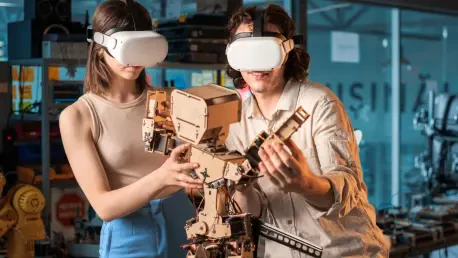In a world where technology is rapidly reshaping industrial landscapes, Korea has emerged as a frontrunner with a groundbreaking event that took place from September 3 to 5 at the COEX Magok Convention Center. This pioneering exhibition, dedicated entirely to the integration of artificial intelligence in industrial sectors, drew global attention by presenting an impressive lineup of innovations. With 133 companies occupying 320 booths, the event served as a dynamic platform to unveil cutting-edge AI solutions designed to transform manufacturing and beyond. It highlighted not only the technological advancements but also the nation’s commitment to driving industrial evolution through AI. Attendees witnessed firsthand how this technology is becoming a cornerstone for efficiency and innovation, setting a new benchmark for what industries can achieve when powered by intelligent systems.
Revolutionizing Industrial Practices with AI
Addressing Core Industrial Challenges
The event placed a strong emphasis on the practical applications of AI in overcoming significant hurdles faced by industries today. A wide range of critical tasks, including market forecasting, supply chain optimization, predictive maintenance, process control, safety protocols, workforce training, and cybersecurity, were explored in depth. Exhibitors showcased how AI-driven solutions are enhancing operational resilience and efficiency across these domains. Notably, industry leaders like HD Hyundai presented compelling real-world examples of AI integration in shipbuilding and construction equipment, illustrating tangible benefits such as reduced downtime and improved safety measures. These demonstrations underscored the potential for AI to redefine traditional industrial processes by providing smarter, data-driven approaches to problem-solving, ultimately fostering a more agile and responsive industrial ecosystem.
Emerging Technologies Shaping the Future
Beyond addressing immediate challenges, the exhibition also served as a launchpad for next-generation technologies poised to redefine industrial automation. Innovations such as robotics, on-device AI, and physical AI took center stage, offering a glimpse into the future of industrial operations. These advancements promise to bring unprecedented levels of precision and autonomy to manufacturing environments, reducing human intervention while maximizing output. The debut of such technologies at the event signaled a shift toward more integrated and intelligent systems that can adapt to complex, real-time demands. This focus on cutting-edge solutions highlighted Korea’s role as a pioneer in pushing the boundaries of what AI can achieve in industrial settings, paving the way for transformative changes that could ripple across global markets in the coming years.
Building a Global AI Ecosystem
Fostering International and Domestic Collaboration
A defining feature of the event was the powerful synergy between international tech giants and local Korean companies, creating a fertile ground for innovation. Global leaders such as Microsoft, Dassault Systèmes, HP, and Salesforce collaborated with domestic firms to showcase AI-driven solutions tailored for manufacturing, customer management, and design optimization. These partnerships not only strengthened business-to-business connections within Korea but also positioned the nation as a key player on the global stage. The opening ceremony amplified this collaborative spirit, featuring government officials and industry executives who signed a memorandum of understanding for a manufacturing data-sharing ecosystem. Such initiatives reflect a shared commitment to leveraging AI for mutual growth, ensuring that Korea remains competitive in an increasingly interconnected industrial landscape.
Creating Platforms for Knowledge and Innovation
In addition to the exhibitions, the event cultivated a robust ecosystem through a variety of programs designed to foster knowledge exchange and innovation. The Industrial AI Conference delved into case studies and business models, while AI-Tech Seminars highlighted new technologies and successful commercialization stories. Other initiatives, such as 1:1 Business Matching sessions, Startup IR pitches, and Investment Networking opportunities, connected suppliers, enterprises, and emerging talents. The Industrial AI International Certification Forum addressed critical topics like reliability, safety, and global standards, ensuring that AI adoption aligns with best practices. Interactive guided tours and specialized programs further engaged attendees by illustrating AI’s practical applications across diverse sectors. These efforts collectively reinforced the importance of a supportive framework for AI integration, driving both technological and economic progress.
Reflecting on a Milestone in Industrial Progress
Celebrating Achievements and Setting New Goals
Looking back, the event at COEX Magok Convention Center stood as a landmark moment in Korea’s journey toward AI-driven industrial transformation. It successfully brought together a diverse array of stakeholders to celebrate current achievements in AI integration, from enhanced operational efficiencies to groundbreaking technological debuts. The collaborative efforts between global and local entities, coupled with the recognition of 25 key contributors to digital transformation during the awards ceremony, underscored a collective resolve to push industrial boundaries. This gathering not only highlighted the strides made in embedding AI into core industrial functions but also emphasized the nation’s ambition to remain at the forefront of technological innovation.
Charting the Path Forward for AI Integration
As the curtains closed on this significant event, the focus shifted to actionable steps for sustaining the momentum. Industry leaders and policymakers are now tasked with building on the partnerships forged, ensuring that the data-sharing ecosystems and global standards discussed become operational realities. Continued investment in emerging technologies like robotics and on-device AI will be crucial for maintaining competitive edges. Moreover, expanding educational and training programs to prepare workforces for an AI-centric future emerged as a priority. The insights gained from conferences and seminars held during the expo provide a roadmap for scaling AI adoption responsibly. Moving forward, fostering an environment of innovation through ongoing collaboration and knowledge exchange will ensure that Korea’s industrial landscape continues to evolve, setting a global standard for others to follow.









